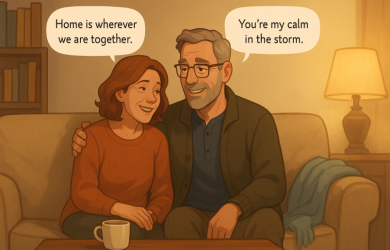7 Most Important Relationship Psychology Check-Ins

Unlock Daily 30-Sec Tips for a Happier Relationship
👉 Subscribe FREEKey Takeaways
Marriage.com AI Quick Summary
Psychology and relationships are not mutually exclusive. Understanding relationship psychology can help you master the required skills to make the relationship flourish.
Did you know that the chemicals released when we are falling in love are similar to the chemicals released when a person uses cocaine? That’s the science behind love.
It’s true about the psychology of falling in love: that wonderful feeling we get when we are in the heady days of new love when all we want to do is talk to whoever will listen about this wonderful person we just met; when each time we think about them all the pleasure pathways of our brain light up, the feeling that overtakes us is just like a drug.
All that oxytocin ( the attachment chemical) and dopamine (the feel-good chemical) flowing through our neurotransmitter, love or cocaine, it’s the same wonderful feeling. Luckily love is legal and not harmful to our health!
Understanding the psychology of love and relationships
Here is an interesting insight into couples psychology.
We like to think that love and relationships are more art than science, but there is actually plenty of science involved with falling and remaining in love.
Take kissing, for instance. Not all kisses, or kissers, are equal, and we tend to rely on the quality of the kiss as a decision-maker in whether or not to continue dating someone.
A fantastic guy can have all the conventional qualities that might make him seem attractive—handsome, good job-but if he is a bad kisser, research tells us that he won’t end up being our first pick for a partner.
We also tend to kiss a lot at the beginning of a relationship, but often neglect the power of kissing as we settle into a longterm partnership.
But that would be a mistake: happily partnered couples who have been together for years still pay attention to kissing, stating it helps maintain the spark in their couple.
So if you have been together for a decade (or two), don’t skip on the preliminaries: try an old-fashioned make-out session on the sofa, like you did when you were first dating. Tell your man it’s for science!
As our love relationship evolves, we can do periodic relationship psychology check-ins to make sure we are being nourished by it.
Some relationship psychological check-ins might include:
1. Needs, yours and your partner’s
Are you able to state your needs without fear of criticism or mockery by your partner? Does your partner listen respectfully and offer meaningful feedback, including a plan to meet your needs? Do you do the same for him?
2. Measuring the success of your relationship
While no single relationship can be expected to fulfill all our needs, you do want your marriage to be at the top of the list of relationships that make you thrive and feel like you have an important role in someone else’s life.
3. Level of emotional intimacy
As per the love psychology, your marriage should be the most intimate relationship you have, above and beyond the relationships you have with your children, your friends, and your work colleagues.
Marriage should be your harbor, your safe haven, your shoulder to lean on. Make sure you remain invested in the emotional intimacy factor of your relationship.
Also watch:
4. Have plans for the future
As per the important principles of relationship psychology, even if you have been together for a long time, it is important for the psychological health of your relationship to have plans for the future.
From small plans, like where you will be vacationing this year, to large plans, such as what you would like to be doing ten years from now, imagining your shared future is an important exercise to do from time to time with your partner.
5. The ebb and flow of love
Psychologists in the field of relationship psychology, who specialize in studying love dynamics note that it is entirely normal for couples to experience moments of distance, both mental and physical, during their lives together.
This « breathing space » can actually be beneficial to the health of the relationship, provided that the couple remains committed to communicating their love, respect, admiration, and gratitude for each other.
An example of this would be the « enforced long-distance relationship », a couple who, for professional reasons, is obligated to physically split and live in different cities for a set amount of time.
If the two people involved are committed to the relationship and proactively communicate their love for each other despite not being physically together, this moment of distance can enhance and strengthen the relationship.
This proves the old adage of « Absence makes the heart grow fonder » but it does depend on the communication abilities of the two people involved.
6. Emotional distance
According to relationship psychology, emotional distance can also occur in a relationship, and may or may not be cause for concern.
According to the psychology of relationships and love, factors such as a new baby or stress at work are normal events that may temporarily cause some emotional distance to develop between a couple.
This is usually short-lived and will decrease with time and adaptation.
It is important to talk about what is happening if only to acknowledge that you are aware of the situation and to assure each other that once you are « out of the woods », your normal closeness will return.
How does this benefit your relationship? These are teaching moments. Try to follow positive psychology about relationships. Start by learning more about your partner. As time passes, likes, dislikes, preferences, and thought processes – all change.
Once you have gone through a stretch of emotional distance and come out on the other side, the relationship is deepened and both people see that they can weather a storm and survive (and thrive).
7. Love is in the smaller acts
When it comes to the psychology behind love, often we think that the larger the demonstration, the more love that person is feeling. But love psychologists have found that according to relationship psychology, it is the small acts of love that bind long-term couples. In fact, if you understand the psychology behind relationships, it is often the common slip-ups that eventually lead to relationship failure.
We all know stories of large-scale displays of love: the man who proposed to his girlfriend over the plane’s intercom system or proclaimed his love by delivering one hundred red roses to his girlfriend’s workplace.
These do sound romantic (especially in movies), but happy longterm couples tell us what says « I love you » best: the hot cup of coffee brought to the bedside in the morning, the trash being taken out without having to ask, the « You look so beautiful » uttered spontaneously.
By being mindful of the science of relationships and relationship psychology, and following small thoughtful acts we can remind ourselves that someone values us and we are important to them.
 Tips
Tips
Write your tip or submit a video tip
All tips are reviewed before the publishing.
Share this article on
Want to have a happier, healthier marriage?
If you feel disconnected or frustrated about the state of your marriage but want to avoid separation and/or divorce, the marriage.com course meant for married couples is an excellent resource to help you overcome the most challenging aspects of being married.
Recent Articles
Related Quizzes
Unlock Daily 30-Sec Tips for a Happier, Healthier Relationship
👉 Subscribe FREE on YouTube We'd love your feedback!
We'd love your feedback!
 Expert Q&A
Expert Q&A
Ask your question related to this topic & get the support you deserve from experts.



















 Thanks for your feedback!
Thanks for your feedback!